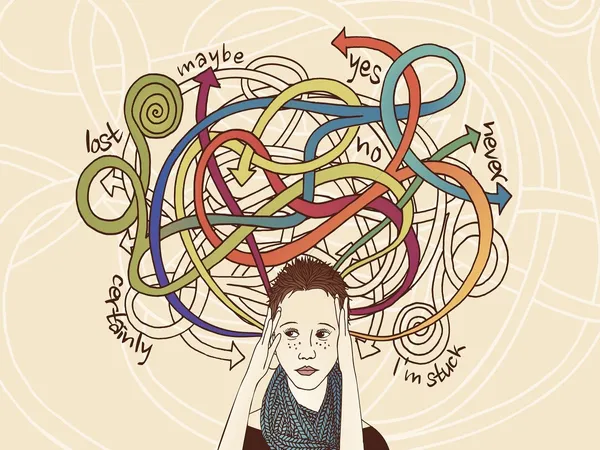You know the feeling. You find yourself sitting at your desk, staring blankly at the screen in front of you. You’re supposed to be working on a project, but instead, your mind is racing through all of the ways that it could fail—and every time it thinks of one more way it could fail, all of your energy goes into thinking about how it will fail.
Overthinking is something that happens to us all the time, but it’s not always easy to tell when you’re overthinking and when you’re just doing what comes naturally in our day-to-day lives.
But what is overthinking? What causes overthinking? And how to stop overthinking before it takes over our lives?
What does “overthinking” mean?
In simple words, the overthinking definition would be to dwell on and ruminate over situations, overanalyzing them. It is also sometimes a spiral of thoughts that leads to thinking of the worst-case scenario and bums you out. While overanalyzing helps to think over minute details and perfect them, it is exhausting and leads to persistent worry. Overthinking is associated with disorders like depression, anxiety, obsessive-compulsive disorder, and post-traumatic stress disorder.
Signs you might be overthinking
You might be wondering whether your 3 a.m. thoughts are overthinking or not. Here are a few signs of overthinking:
- You always think about the worst-case scenario.
- You dwell on your past mistakes.
- You replay conversations or situations repeatedly in your head, most often with how you would have done it differently.
- You worry excessively about the future.
- You spend more time thinking than doing.
- You are often unsure, uncertain or second-guess your decisions.
- You lose sleep over hours of snowball thinking.
Any kind of frequent thinking that is unproductive and leads to negative thoughts and feelings could be termed “overthinking.”
So what causes this overthinking?
Causes of overthinking
Over time, it can seem like overthinking has just become a habit, but there can be various causes or reasons for overthinking.
- Childhood Learning
Strict parenting or trauma can lead to hypervigilance in children. Such children may be constantly worried about their actions and therefore overthink them. They might also turn into perfectionists and overanalyze every aspect until it is perfect. They might be hard on themselves and ruminate over their mistakes.
- Control and Selflessness
Overthinking can intensify when it is about things out of your control. When you cannot control certain things, it makes you feel helpless and worried about how things will work out. Alternatively, overthinking may help you smooth out the tiniest details and make you feel in control of the situation.
- Need for Perfectionism
Some people have a perfectionist personality. Overthinking aids in their pursuit of perfection.
- Conflict Avoidance
Some people dislike and avoid confrontations or conflicts. To avoid getting into uncomfortable situations or being caught wide-eyed, overthinking helps them be prepared for conflicts and confrontations. It helps them reduce the anxiety and uncertainty that a conflict brings.
How to stop overthinking?
Overthinking can be an exhausting and taxing feeling to go through. It is essential to cope with it and healthily manage it.
- Find the Cause
Overthinking can occur for a variety of reasons. It is important to introspect and understand what causes you to overthink. It can help to deal with the underlying cause and overcome overthinking.
- Track your Thoughts
Sometimes, the thoughts can feel catastrophic. The intensity can reduce once the thoughts are externalized. Tracking your thoughts by writing them down or drawing them can help.
- STOP Technique
The most effective and quick technique to stop overthinking is to recognize and immediately stop negative thoughts. To stop overthinking, use a mental distraction or a verbal self-conversation.
- Mindfulness and Relaxation
Overthinking can be accompanied by or be a result of anxiety. To cope with anxiety, mindfulness and relaxation techniques are effective. A compassionate body scan, meditation, and 54321 techniques are a few relaxation techniques to stay present.
- Seek Help
Dealing with overthinking alone can be difficult. Talking to a close friend or loved one can help take the load of overthinking off of you.
Note from Siraya: Mental Wellness Centre-
Sometimes overthinking can become all-consuming, which can be harder to manage. In such cases, it is helpful to seek professional help. Psychologists can assist in finding the root cause of overthinking and provide you with effective coping strategies. Siraya has a team of qualified psychologists and professionals who can help you with overthinking and related concerns.

